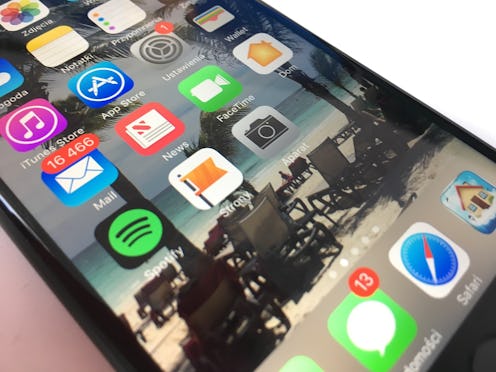You may have been told to force quit the apps you're not using on your iPhone to save the battery, but it turns out that, according to some tech experts, force-quitting your iPhone apps might actually be draining the battery instead. Um, guilty right here: I do this all of the time, and my battery seems to drain super fast. To be clear, force-quitting your apps is when you double tap the home button to make all of your open apps show up — you then swipe them to force-quit. Apparently, even Apple employees have recommended against force-quitting iPhone apps — Apple's software SVP has even said it's not necessary.
"The single biggest misconception about iOS is that it’s good digital hygiene to force quit apps that you aren’t using," tech writer and Apple expert John Gruber wrote on the blog Daring Fireball. "The idea is that apps in the background are locking up unnecessary RAM and consuming unnecessary CPU cycles, thus hurting performance and wasting battery life. That’s not how iOS works."
I'm not sure where this force-quit rumor started, but pretty much every iPhone user I know thinks this is the way to save battery life, and we're all wondering why our batteries are draining faster instead. In fact, Gruber even references an email reportedly from Steve Jobs in 2010: "'Just use [iOS multitasking] as designed, and you’ll be happy,'" Gruber quotes Jobs as saying. "'No need to ever quit apps.'"
Gruber wrote the the force-quit myth is so pervasive that he's even heard that Apple store employees have recommended it to customers.
"The iOS system is designed so that none of the above justifications for force quitting are true. Apps in the background are effectively 'frozen,' severely limiting what they can do in the background and freeing up the RAM they were using," Gruber explained on his blog. "iOS is really, really good at this. It is so good at this that unfreezing a frozen app takes up way less CPU (and energy) than relaunching an app that had been force quit. Not only does force quitting your apps not help, it actually hurts. Your battery life will be worse and it will take much longer to switch apps if you force quit apps in the background."
Gruber wrote that this You Tube video pitting the iPhone 7 against the Samsung Galaxy S8 is a perfect example of the iPhone 7 winning the speed test without closing any apps.
"The S8 has to relaunch all (or at least almost all) of the apps, because Android has forced them to quit while in the background to reclaim the RAM they were using," Gruber wrote. "On the iPhone, all (or nearly all) of the apps re-animate almost instantly."
He goes on to say that a lot of work went into creating an iOS that keeps your apps open but doesn't run them while you're not using them.
"It’s a huge technical advantage that iOS holds over Android," he explained. "And every iPhone user in the world who habitually force quits background apps manually is wasting all of the effort that went into this while simultaneously wasting their own device’s battery life and making everything slower for themselves."
